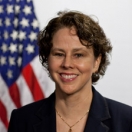
Last January, I listened to the President ask hundreds of college presidents to increase college opportunity for all Americans. He asked them to help because a college degree remains one of the surest pathways into the middle class in America, and is an especially powerful engine of social and economic mobility.
Over this decade, nearly 8 in 10 new jobs will require some postsecondary education or training beyond high school. And of the 30 fastest growing occupations, half require a college degree. At the same time, college graduates earn an average of 77 percent more per hour than a high school graduate. President Obama set forth a goal early in his first term to guide our work in education – to lead the world with the highest proportion of college graduates by 2020.
And yesterday, I had the privilege of joining Secretary Duncan in meeting with community college leaders who have made new commitments to ensure student success, because, in order to make progress on our goal to be first in the world, we need to embrace some of the foundational challenges to college enrollment, persistence, and completion.
Our nation’s community colleges are the engines of our higher education system. As the largest part of America’s higher education system, these institutions provide the education and training to prepare our 21st century workforce and are an ideal place to raise the knowledge and skills of our workforce – and to meet the academic needs of a diverse population of learners, from recent high school graduates to adults seeking new skills.
Following yesterday’s meeting, today we are announcing several developments in our efforts to expand college opportunity for all:
- The White House announces second College Opportunity Summit: The Administration is announcing that the White House will host another College Opportunity Summit on December 4, 2014. The goal of this conference will build on the work launched in the first College Opportunity Summit last January, while launching initiatives in new areas. This year’s summit will focus on building sustainable collaborations in communities with strong K-12 and higher education partnerships to encourage college going, and supporting colleges to work together to dramatically improve persistence and increase college completion, especially for first-generation, low-income, and underrepresented students.
- New community college partners working to expand college opportunity: The Administration is announcing 14 new commitments by community colleges to expand college opportunity by strengthening college readiness for academically underprepared students, building on the more than 100 colleges and universities and 40 nonprofit organizations who made commitments in January.
- New commitments from the field to strengthen college readiness: The Department of Education’s Institute for Education Studies (IES) is launching a new Center for the Analysis of Postsecondary Readiness (CAPR) led by the Community College Research Center (CCRC) at Teachers College, Columbia University and the social policy research organization MDRC that will work to strengthen the research, evaluation, and support of college-readiness efforts across the nation. In addition, Khan Academy is announcing new commitments that will focus on technology-based solutions customized to improve student success in developmental math. Lastly, the Great Lakes Higher Education Guaranty Corporation will commit $5 million, partnering with MDRC, the Ohio Board of Regents, and City University of New York (CUNY) to replicate CUNY’s successful Accelerated Study in Associate Programs (ASAP) to support as many as 2,000 community college students in Ohio to help more students graduate sooner.
- Continued progress on ongoing college opportunity commitments: In addition to new commitments, we continue to make progress on our previously announced efforts to expand access to college for all students, including efforts to improve the effectiveness of college advising and enhance support for school counselors, and increasing efforts to boost student achievement in science, technology, engineering, and mathematics (STEM) and to broaden participation in STEM fields to women, underrepresented groups, and students from low-income or underserved communities.
These efforts have inspired engagement and supported the progress of education leaders who are taking collective action in their schools, on college campuses, and in their communities to do all they can to help more low-income students prepare to enter and succeed in college.


